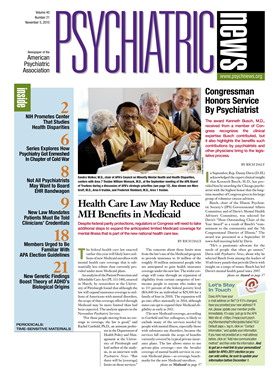Factors relating to both patients and health care professionals may stand in the way of better care for innercity patients with posttraumatic stress disorder (PTSD) symptoms, but in a study of patients in a primary care clinic at Howard University Hospital, insurance status did not.
Primary care is important for African-American patients with PTSD because, compared with whites, they are less likely to seek mental health treatment from specialists, said Tanya Alim, M.D., an assistant professor of psychiatry at Howard.
“So the primary-care setting is critical for detecting and treating PTSD and depression in African Americans,” she said at the E.Y. Williams Symposium on PTSD and African Americans, held at the university in Washington, D.C., in September.
For their study, Alim and colleagues screened 738 patients in waiting rooms at Howard University Hospital. The patients' average age was 41; 69 percent were women, and 96 percent were African American. Most had been exposed to at least one form of trauma.
About 35 percent were privately insured, and 65 percent were covered by public insurance—either Medicaid, Medicare, or the District of Columbia's plan for patients awaiting assignment to Medicaid. The study did not cover uninsured patients.
The 288 people who screened positive for PTSD symptoms were later evaluated with the Clinician-Administered Posttraumatic Stress Scale (CAPS) and the Structured Clinical Interview—DSM-IV (SCID-IV). Of those, 25 percent were diagnosed with PTSD, and 12 percent with major depressive disorder.
Patients preferred to be treated with psychotherapy rather than an SSRI antidepressant, she found. About 50 percent of both the publicly and privately insured patients chose psychotherapy treatment alone, and 16 percent accepted SSRIs alone for their treatment. There was no statistically significant difference in access to care or use of pharmacological treatment between public and privately insured patients.
Rather than have patients who rejected SSRI treatment go without care, the providers at the clinic worked to get them into psychotherapy, she said.
The preference for psychotherapy came as no surprise to Alim. Other research has shown some cultural biases against use of medication in general among African Americans, sometimes expressed as fear of being “a guinea pig,” she said.
African Americans also report spotty treatment compliance, a skeptical attitude toward medication efficacy, and a low sense of participation in the medical decision-making process, she added. Transportation and child-care problems also are barriers to treatment, as are low incomes and low levels of health literacy.
The health care system may throw up other barriers, she said. The increasing cost of treatment, diminished insurance coverage, and cash-only medical services are one set of hurdles. In addition, health care professionals who do not have appropriate cultural understanding of their patients or who are poor collaborators are another.
The study was funded by the National Institute of Mental Health and a Howard University faculty research grant.


